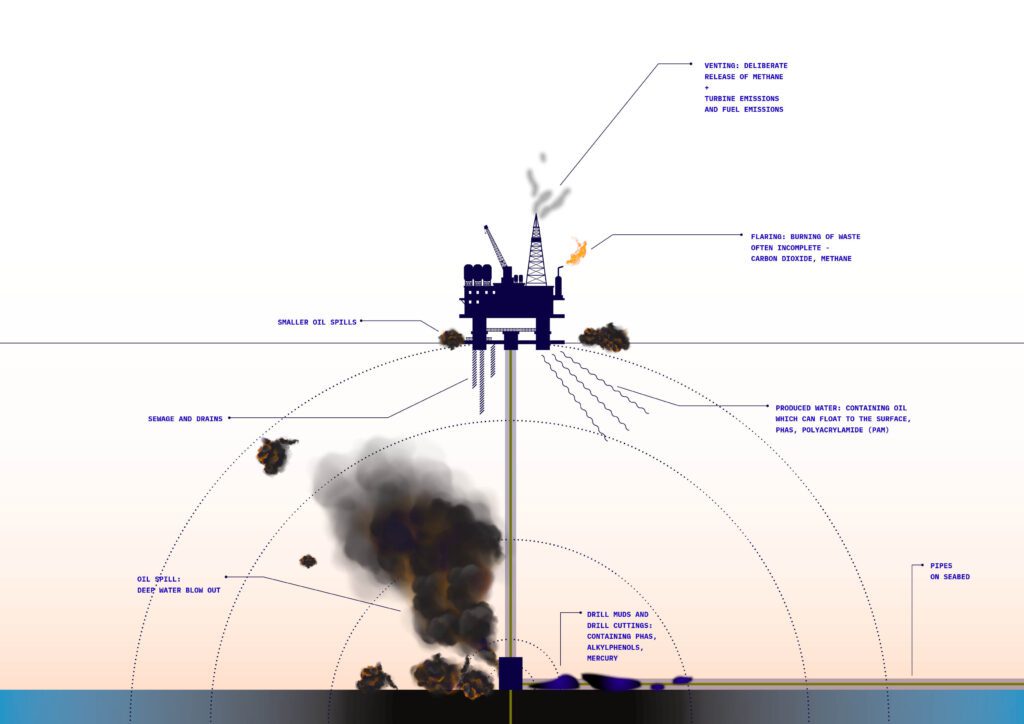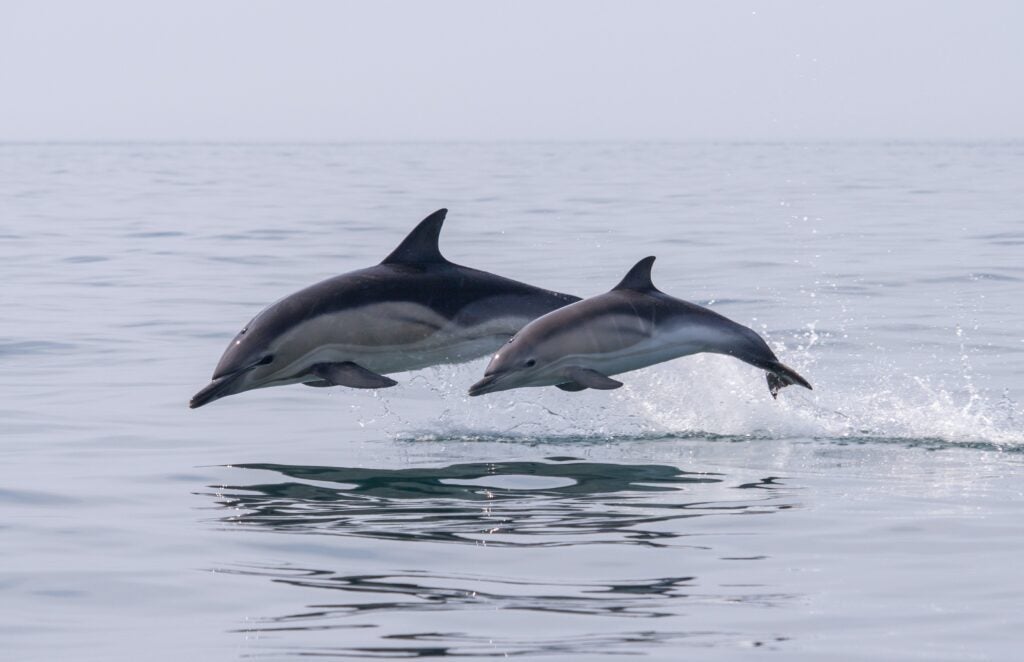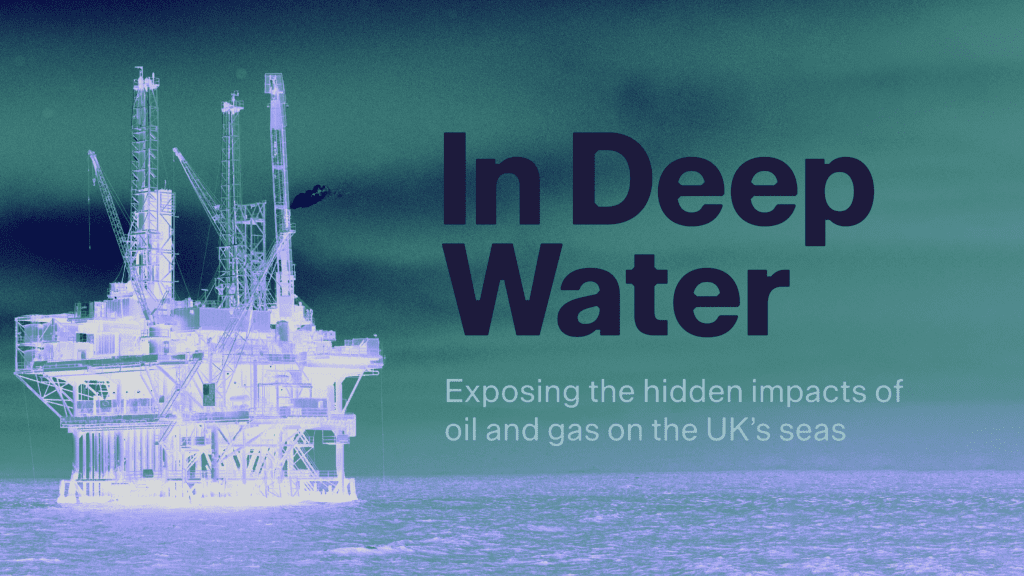Report | April, 2023
In Deep Water: Exposing the hidden impacts of oil and gas on the UK’s seas
Oceana has partnered with the climate campaign group Uplift to release the first ever comprehensive review of how the oil and gas industry is damaging the UK’s seas.
UK waters are well known for their abundance of large whales, dolphins and seabirds, seals, deep sponge communities and cold water reefs; many of which are endangered species. Newly published FOI data in In Deep Water reveals that these species are subject to a constant flow of small oil spills, which has the potential to kill sea life and to significantly impact the life chances and reproductive success of others. As well as routine oil spills, the report shows how oil and gas production harms marine life through toxic chemicals, microplastics, and extreme noise pollution through seismic blasting.

Satellite imagery from SkyTruth is also a feature of the report, showing images of this chronic oiling in UK waters from space. The FOI data revealed that just under 13,000 tonnes* of oil have been released into UK waters by the oil and gas industry in the last five years.

All of this, despite claims touted by the UK government that we are a global leader in marine protection, having committed to protecting 30% of the world’s oceans by 2030. The fact that they are, at the same time, giving out new licences for oil and gas development in UK Marine Protected Areas, sits in stark contradiction with these promises.
The impacts of oil and gas on UK seas

The oil and gas industry harms our seas in three ways:
- Pollution from oil, chemicals and noise
Oil and gas development is a major source of pollution in our seas, including oil spills, the release of chemicals and microplastics during all phases of production, and a wide range of noise pollution.
Chronic oil pollution, for example, is released in waste water and in small but routine spills, often unreported or underreported. This can lead to large volumes of oil being released into the sea, including protected areas. Exploration, drilling, and decommissioning of oil and gas infrastructure also lead to the release of toxic chemicals, including PAHs and mercury, which cause extreme harm or even death to individual creatures across species populations and whole ecosystems. Micro-plastic waste is also released as part of the extraction process, directly polluting the marine environment.
Noise pollution, again created by all stages of oil and gas production, is another major cause of harm, impacting entire ecosystems. In particular, seismic airgun surveys – the loudest and most damaging source of anthropogenic marine noise pollution, which is used almost exclusively in offshore oil and gas exploration – causes severe harm to protected marine mammals, commercially important fish species and invertebrates.
- Destruction of habitats, food chains and marine life
Beyond creating these types of direct pollution in our seas, oil and gas developments are harming some of the UK’s precious marine habitats, vital food chains and whole ecosystems.
The UK is home to some extraordinarily biodiverse habitats, such as deep sponge communities, cold water corals, deep sea mud and sandbanks. As oil rigs and other infrastructure are built on or near some of these, it is leading to habitat loss, some which could take decades or more to recover, if at all.
These habitats play an important role in our seas. Deep-sea sponge communities and cold-water corals, for example, cycle nutrients in the ocean. Losing or degrading these habitats jeopardises this crucial function. Oil and gas activity also has multiple negative effects on plankton, the basis of marine food webs ,from noise and oil pollution, persistent chemicals and contamination by microplastics.
- Weakening of UK seas when they need restoring
Allowing continued investment in new oil and gas developments will mean decades more of these impacts on the UK’s marine environment at a time when we need to be investing in restoring our seas.
Permitting new oil and gas activity in designated protected areas fundamentally undermines their potential to restore biodiversity and provide the many other benefits – from supporting sustainable fisheries to protecting our coasts – that we gain from having a thriving marine environment.
UK waters play a critical role too in tackling the climate crisis. Expanding oil and gas production impacts our seas’ ability to act as a carbon store both directly, weakening this function by degrading the marine environment and increasing emissions. The continued burning of fossil fuels is having a catastrophic impact on the world’s oceans and seas. Unless it is rapidly halted, it will lead to the ecological collapse of many marine ecosystems.
What are Oceana and Uplift calling for?
We are calling for an end to new exploration licences or production approvals for offshore oil and gas developments. Before the UK can start showing leadership on marine protection globally, we need to get our own house in order.
*2 May 2023 – Please note this has been edited from the original figure of 22,000 tonnes of oil. Further information on this has been provided by Uplift below.
On 13 April, Uplift shared analysis of data released to it by OPRED under the Environmental Information Regulations covering the volume of oil that has been spilled into UK seas by oil and gas companies between 2017 and 2022; the proportion of those spills that were in breach of permits to discharge oil; and the volume of oil spilled in that period by 12 individual companies. None of this data featured at any point in the accompanying In Deep Water report.
OPRED has subsequently communicated that it made a major error in the data it provided to Uplift and that the total volume of oil spilled over that period is closer to 13,000 tonnes, rather than 22,000 tonnes. This error led to an overstatement of the percentage of oil spilled in breach of permits. OPRED’s inaccurate data, with an additional small coding error by Uplift, led to incorrect company polluter rankings published as part of Uplift’s press release. There may also have been an error in Uplift’s analysis of OPRED’s data – stemming in part from OPRED’s formatting and disclosure of the data – which we are currently seeking to resolve with OPRED.
Uplift has sought further clarification from OPRED of its data and has removed its analysis in the meantime. Its analysis will be updated in full as soon as this clarification is received from OPRED. It is clearly in the public interest for the regulator to collect and publish accurate industry data on oil spilled into British waters, and crucially to routinely monitor and verify this data to ensure compliance.

